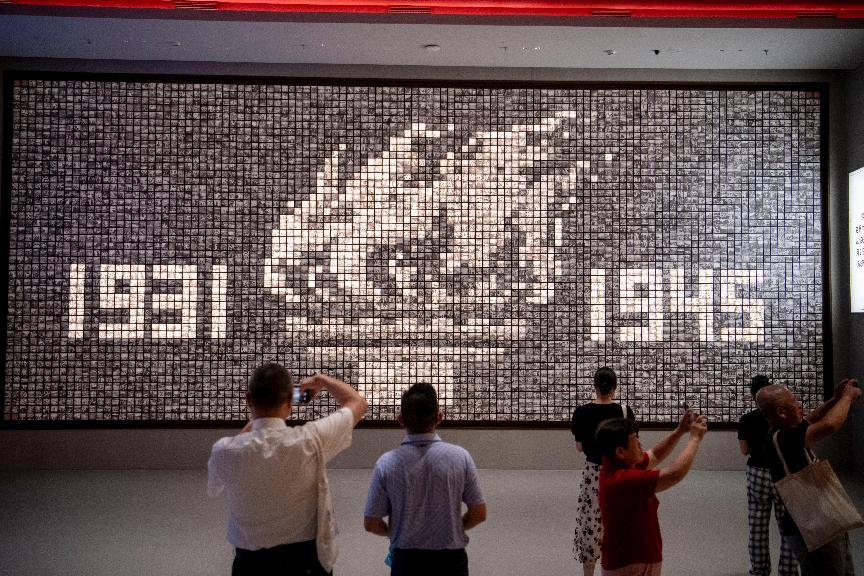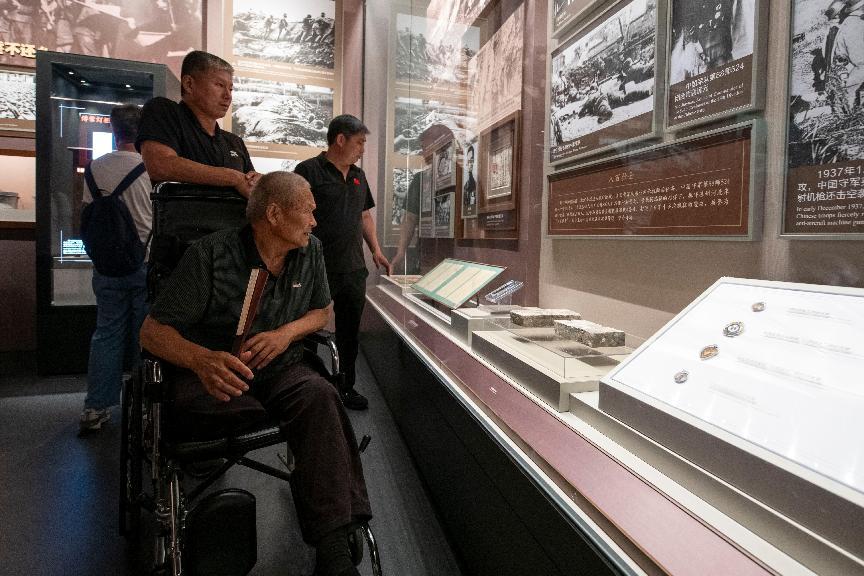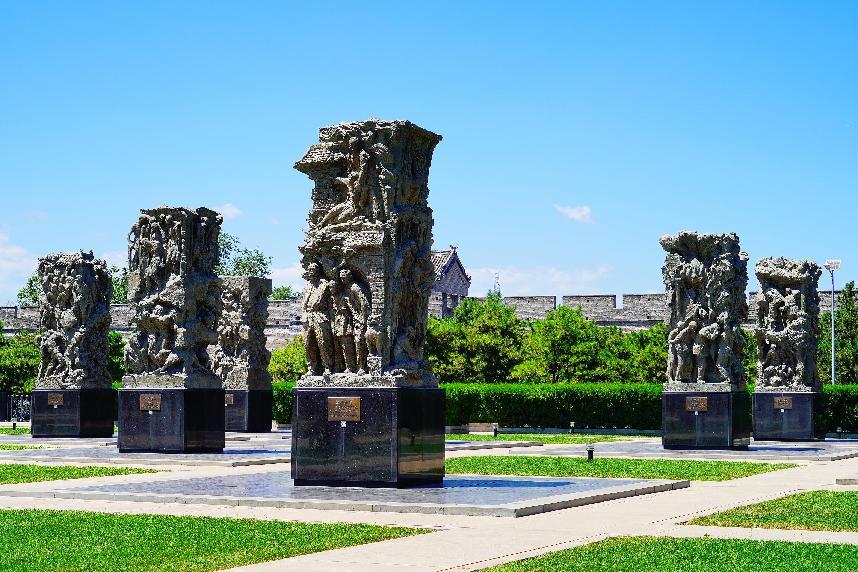




- BRNN
- BRI News
- BRNN News
- Database
Official Documents Polices and Regulations
Inter-government Documents International Cooperation BRI Countries
Business Guide Economic Data BRI Data
Trade
Investment Projects Latest projects
Cases - Content Pool

People visit an exhibition themed "For National Liberation and World Peace" at the Museum of the War of Chinese People's Resistance Against Japanese Aggression in Beijing, capital of China, July 8, 2025, to commemorate the 80th anniversary of the victory in the Chinese People's War of Resistance Against Japanese Aggression and the World Anti-Fascist War. (Photo by Weng Qiyu/People's Daily Online)
This year marks the 80th anniversary of two pivotal events: the victory of the Chinese People's War of Resistance Against Japanese Aggression and the World Anti-Fascist War, as well as the 80th anniversary of the founding of the United Nations (UN).
This hard-won triumph ended the global threat of militarism and fascism, prompting profound reflection on the devastation of war and galvanizing international efforts to rebuild a rules-based order.
As a founding member of the anti-fascist alliance, China played an instrumental role in establishing the UN and shaping its Charter - launching a new chapter in global cooperation for peace and development.
Over eight decades, the UN has served as the cornerstone of international security, underpinning global stability and prosperity. Yet today, this vital institution and the principles it upholds face unprecedented tests.
While unilateralism and coercive actions proliferate, certain countries prioritize their narrow self-interest, disregarding the purposes and principles of the UN Charter. They elevate domestic legislation above international law and obligations, contravening fundamental norms such as the sovereign equality and non-interference in internal affairs. Their actions have severely undermined the credibility of the international system.
Concurrently, global deficits in peace, development, security, and governance intensify. Yet some countries cling to Cold War mentality and zero-sum approaches, forming exclusionary blocs under the guise of "shared values," thereby exacerbating geopolitical fragmentation.

People visit an exhibition themed "For National Liberation and World Peace" at the Museum of the War of Chinese People's Resistance Against Japanese Aggression in Beijing, capital of China, July 8, 2025, to commemorate the 80th anniversary of the victory in the Chinese People's War of Resistance Against Japanese Aggression and the World Anti-Fascist War. (Photo by Weng Qiyu/People's Daily Online)
Chinese President Xi Jinping has emphasized that "The more turbulent and complex the international situation becomes, the more we must uphold and defend the authority of the UN, firmly uphold the UN-centered international system."
In this context, preserving the UN-centered order requires all member states to fulfill their obligations, with major countries demonstrating leadership commensurate with their influence.
As a founding member of the UN and a permanent member of the UN Security Council, China has consistently championed the Council's primary role in addressing peace and security issues. China is the largest troop contributor to peacekeeping operations among the five permanent members of the UN Security Council and the second-largest contributor to the UN regular budget and peacekeeping assessments. China has also joined nearly all universal intergovernmental organizations and over 600 international conventions and amendments, and concluded more than 27,000 bilateral treaties with other countries.
As a major country, China follows a path of non-alignment, non-confrontation and non-targeting of any third party, and has taken concrete actions to reinforce the UN's authority and its central role in coordinating national interests and tackling global challenges. This conduct exemplifies fidelity to the UN-centered international system.
Today, facing the challenges against the authority and effectiveness of the international system, major countries must abandon geopolitical "small cliques" and rivalry-driven blocs. They must oppose any attempts to distort the historical verdict of World War II, undermine the principles underpinning the postwar international order, or weaken the UN's central role in maintaining global peace and security.
They should deepen cooperation within the frameworks of the UN Security Council, General Assembly, and other bodies, seek lasting and equitable solutions to global challenges based on the purposes and principles of the UN Charter, and strive to balance the interests of all parties.

Photo shows the Sculpture Garden of the Chinese People's War of Resistance Against Japanese Aggression in Beijing, capital of China. (Photo by Song Jiaru/People's Daily Online)
Following the end of the Cold War, the world has experienced a profound transformation toward multipolarity and deeper economic globalization. The historical trend of peace, development and win-win cooperation is unstoppable, reflecting the shared aspirations of the vast majority of countries and the underlying logic of historical progress and the advancement of human society.
The global balance of power today has fundamentally changed from what it was 80 years ago. According to the International Monetary Fund, emerging markets and developing countries - collectively referred to as the Global South - have contributed as much as 80 percent of the world's economic growth in the past 20 years, and now account for over 40 percent of global GDP.
By purchasing power parity, the GDP of the BRICS countries has surpassed that of the G7 before its expansion. After the expansion, BRICS accounts for nearly half of the global population and one-fifth of global trade.
These figures not only reflect a dramatic transformation in the global economic landscape, but also signal the rise of the Global South from a "silent majority" in global affairs to an indispensable force advancing peace, development, and global governance.
As a natural member of the Global South, China shares common perspectives and aspirations with fellow developing and emerging economies when it comes to improving the international order and global governance.
China remains committed to enhancing the voice and representation of the Global South within major multilateral mechanisms, including the UN, the World Trade Organization, and the International Monetary Fund, ensuring global governance system better reflects contemporary political and economic realities.
In a world undergoing profound changes unseen in a century, safeguarding the victories of World War II and the postwar international order transcends historical commemoration. It constitutes a vital, active endeavor imperative for preserving global peace and advancing common development.
Only by shouldering the responsibilities of the times, acknowledging the irreversible trend toward multipolarity, and responding to the call of the Global South can the world preserve the collective memory of humanity, cement the foundations of peace and development, and ensure that the hard-won victories of World War II continue to illuminate the path toward a more peaceful, equitable, and prosperous world.
(Zhao Long is the deputy director of the Institute for International Strategic and Security Studies at Shanghai Institutes for International Studies)

Tel:86-10-65363107, 86-10-65368220, 86-10-65363106